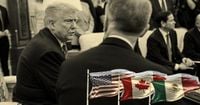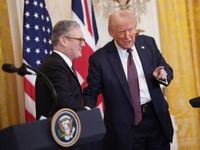The United States and United Kingdom announced a trade deal Thursday, the first significant pact since U.S. President Donald Trump unleashed his so-called “Liberation Day” tariffs on April 2. Those tariffs, which applied to more than 50 countries and reached eye-watering levels nearing 50 percent in some cases, were paused until July, with the U.S. administration claiming that countries were rushing to make deals to avert a full-on trade war.
Here’s what you need to know about the agreement with the U.K. and what it could mean for Canada’s own negotiations with the U.S.
What’s in the deal?
The deal includes relief on recent tariffs for the United Kingdom, including a 25 percent levy on steel and aluminum. There is also a tariff-rate quota on automobiles, allowing for 100,000 autos to be exported to the U.S. at a reduced tariff rate of 10 percent, lower than the 27.5 percent initially imposed by the U.S. on all foreign-made cars. In exchange, the U.K. will open its market to U.S. agricultural products including beef and produce, as well as ethanol. Trump said this represents a “$5 billion opportunity” for the United States.
It was expected that the U.K. would have to make concessions on its digital services tax, but that was not mentioned by either side in the announcement. “We wouldn’t rule it out yet with negotiations still ongoing,” economists at Toronto-Dominion Bank said in a note Thursday.
Trump said there was also a special carve-out for Rolls-Royce Holdings PLC, allowing airport engines to be exported to Boeing tariff-free — while the U.K. would later announce a commitment to buy $10 billion worth of Boeing planes. He also said that the U.K. will be joining the U.S. in taking steps to counter “dumping” of steel and aluminum to bolster the industry.
U.K. trade authorities said the access negotiated for beef is “reciprocal,” with British farmers given a tariff-free quota for 13,000 metric tonnes, and added that there will be “no weakening of U.K. food standards on imports.” The U.K. will remove a tariff on U.S.-imported ethanol — used to produce beer — and will lower tariffs on more than 2,500 products imported from the U.S. including olive oil, wine, and sports equipment, which account for about £5 billion of U.K. imports.
How significant is the deal?
While Trump boasted that the deal is full and “comprehensive,” it covers only limited sectors and reduces some tariffs, while adding some access for the U.S. and U.K. to each other’s markets. The announcement is expected to be followed by months of work to hammer out further details and paper the deal. “It’s more symbolic than economic,” according to the TD economists, led by chief economist Beata Caranci, who wrote that the agreement is actually a 12-month pact, which is to be followed by a larger agreement still to be negotiated.
U.K. Prime Minister Keir Starmer joined Trump’s news conference in the Oval Office remotely and hailed it as a “really fantastic historic day,” adding that the timing of the trade agreement announcement coincided with the end of the Second World War in Europe 80 years ago.
However, Peter Mandelson, the U.K. ambassador to the United States, who was in the Oval Office, referred to the trade deal as a beginning. “There is yet more we can do in reducing tariffs and trade barriers so as to open up our markets to each other, even more than we’re agreeing to do today, but it also provides us with the platform,” he said.
The trade announcements are not comprehensive, said William Pellerin, a partner in the international trade group at McMillan LLP. “Although the agreement may benefit both (countries) … relief will be sectoral and address a few irritants,” he said. “Any broad or comprehensive agreement would require approval by the U.S. Congress, and that may not yet be in the cards.”
What does it mean for other countries?
Unlike Canada and most of the countries that attracted Trump’s ire, Britain currently has a trade deficit with the United States, making it less of a target (it was only hit with a blanket 10 percent tariff on Liberation Day) and thus far easier to negotiate a deal. Britain’s unique trade relationship with America, which U.S. representatives characterized as balanced once the effects of gold bullion were stripped out, didn’t stop Trump from promising that “many other deals” are coming, saying on social media that they are in “serious stages of negotiation.”
The biggest dispute so far is playing out between the United States and China, with a series of escalating tariffs and counter-tariffs. Officials from Beijing and Washington are expected to meet in Switzerland on the weekend for a round of trade talks. “If we expected this (U.K.) deal to set the tone for future deals, then what we have learned is that these initial announcements are going to be more fine-tuning around the edges and easing of pain points, rather than an end to the trade war,” Caranci and the TD analysts said in their note.
They added that U.S. negotiations with Canada and Mexico, China, and the European Union are far more important to America’s economic outlook and inflation trajectory. “Together, these economies are responsible for over three-quarters of U.S. exports and imports,” the economists said.
What does the U.K. deal mean for Canada in particular?
One positive note for Canada is the reduction of a 25 percent tariff on aluminum and steel, and relief for the automobile industry, which shows that the U.S. may be willing to bend on similar tariffs that were also imposed on Canada. However, Trump pointed out that he would only cut auto deals for unique products such as Rolls-Royce vehicles.
Thursday’s deal could also put pressure on Canada to reach an agreement with the U.S. “Canada stands to benefit if the United States shows openness to lifting sectoral tariffs — like those on autos and steel and aluminum,” Pellerin said. “But there’s a risk: if others succeed in cutting deals, the pressure on Canada to follow suit will grow. Put simply, if the U.K. or other countries gain preferred access to the U.S. market, Canadian exporters could be left at a major disadvantage.”
The U.K.’s willingness to come to the trade table could be positive for Canada because its talks with Britain have been at a standstill since early 2024. “Perhaps with a change in governments in both Canada and the U.K., fresh eyes can be cast on the U.K.-Canada negotiations,” said Clifford Sosnow, chair of the international trade and investment group at Fasken Martineau DuMoulin LLP. “But the tough issues remain: agriculture, in particular access by the U.K. into Canada for cheese and other dairy products, and beef into the U.K., as well as rules governing access to each other’s automobile markets.





